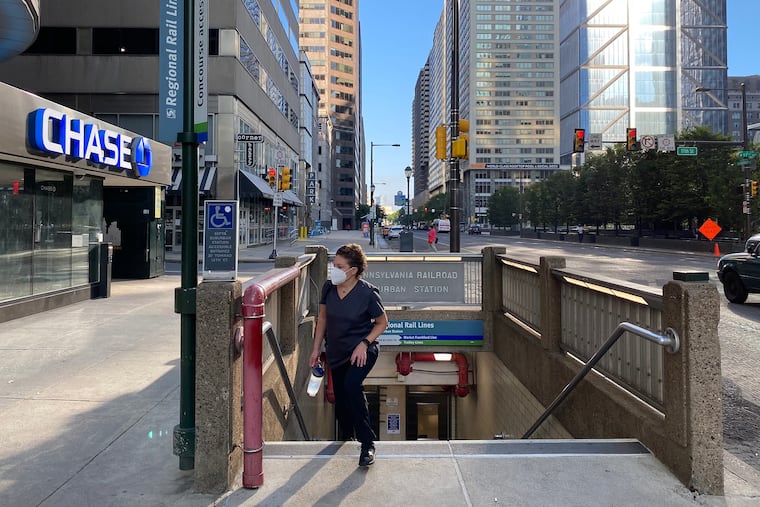SEPTA and other transit systems are in dire need of more coronavirus relief | Opinion
Transit Forward Philadelphia and 5th Square have joined advocates across the commonwealth to demand $32 billion for transit in the HEROES Act, now working its way through Congress.

As Congress negotiates the next big coronavirus relief package, it is clearer than ever that a sustained investment in Pennsylvania’s public transit systems, including SEPTA, is absolutely vital to our region’s recovery.
Funding for public transit in Pennsylvania can be described best as a series of Band-Aid fixes with no long-term solutions. Even before the coronavirus pandemic, Pennsylvania’s transit funding mechanisms were already in a tenuous state. Now, with the financial and ridership impacts of the COVID-19 in full effect, SEPTA and other transit agencies across the commonwealth have bled millions of dollars a week and are on the road to ruin.
On the state level, $450 million in annual public transit funding is supposed to come from the Pennsylvania Turnpike Commission (PTC). However, these payments are set to drop to $50 million in less than two years.
» READ MORE: Face masks are required on SEPTA. Now if only more riders would comply.
Additionally, the payments from PTC have been tenuous at best. This was highlighted last year when a now-dismissed lawsuit delayed millions in transit funding and stalled dozens of capital projects for SEPTA. With the pandemic now taking cars off the road, PTC has once again deferred its payment, citing a drop in turnpike toll revenue.
The federal government also gives Pennsylvania transit agencies short shrift. Federal funding formulas allocate extra money for “high density states,” but Pennsylvania just misses the cutoff. This locks our commonwealth’s transit agencies out from hundreds of millions in additional funding annually that benefits agencies in our bordering and close-by states. As a stark example, transit agencies in the Philadelphia area received less from the last coronavirus relief package than those in the Boston area, despite serving over one million more residents.
According to an analysis by TransitCenter, a national transit advocacy group, Pennsylvania alone needs $1.4 billion to keep transit running through 2021. Without more emergency funding assistance, Pennsylvania’s transit agencies will run short of funds within two months.
Beyond this immediate need, our state and federal legislators need to commit more lasting funding for public transit. On the state level, we need congestion pricing and a surcharge on ride-sharing — both of which have the added benefit of mitigating congestion and incentivizing transit ridership. On the federal level, we must revise our national gasoline tax, which hasn’t changed even with inflation over 26 years. The federal government must also allow Pennsylvania to toll the federal highways that run through our commonwealth.
Why should our region’s residents care about transit funding? Adequate funding for agencies like SEPTA is a social and economic justice issue that directly impacts essential workers, low-income households, and communities of color. Nearly a third of Philadelphia households, most of them low-income, do not own a vehicle, per a 2015 analysis.
» READ MORE: SEPTA faces an unprecedented financial challenge. A plunge in Pa. Turnpike traffic may make it tougher.
Ultimately, these groups rely on functional transit to get to their jobs and fulfill essential tasks like buying groceries, filling prescriptions, and attending doctor’s appointments. Transit also represents a means for economic mobility, providing access to education and work. It is this service that has literally carried society through this pandemic, and Philadelphia’s communities will suffer without fully funded transit.
SEPTA also plays a vital role in our region’s economic recovery. According to a report by the Southeast Partnership for Mobility, the economic benefits of SEPTA’s investments and operations generate $3.05 billion for Pennsylvania annually. Without more emergency assistance from the federal government followed by a sustainable funding source, there will be no regional recovery from the coronavirus.
It’s time for Sen. Bob Casey, Sen. Pat Toomey, and Congress to step up and provide Pennsylvania transit agencies with the emergency relief they need. Transit Forward Philadelphia and 5th Square have both joined advocates from across the commonwealth to demand $32 billion for transit in the HEROES Act, now working its way through Congress.
Our state and federal legislators must also commit to setting up lasting funding sources for public transit. Without it, transit agencies across the commonwealth, including SEPTA, will enter a “death spiral” of service reductions, fare increases, and declining ridership. This will cause increased road congestion, stifled economic recovery, and, for many in our region, a slide back into poverty — all on top of having to recover from a pandemic.
» FAQ: Your coronavirus questions, answered.
Yasha Zarrinkelk is the community organizer of Transit Forward Philadelphia, an advocacy coalition campaigning for equitable transit in southeastern Pennsylvania. @transit4philly Dena Ferrara Driscoll is the chair of 5th Square, a statewide PAC focused on issues around land use, mobility, and the built environment. @bikemamadelphia